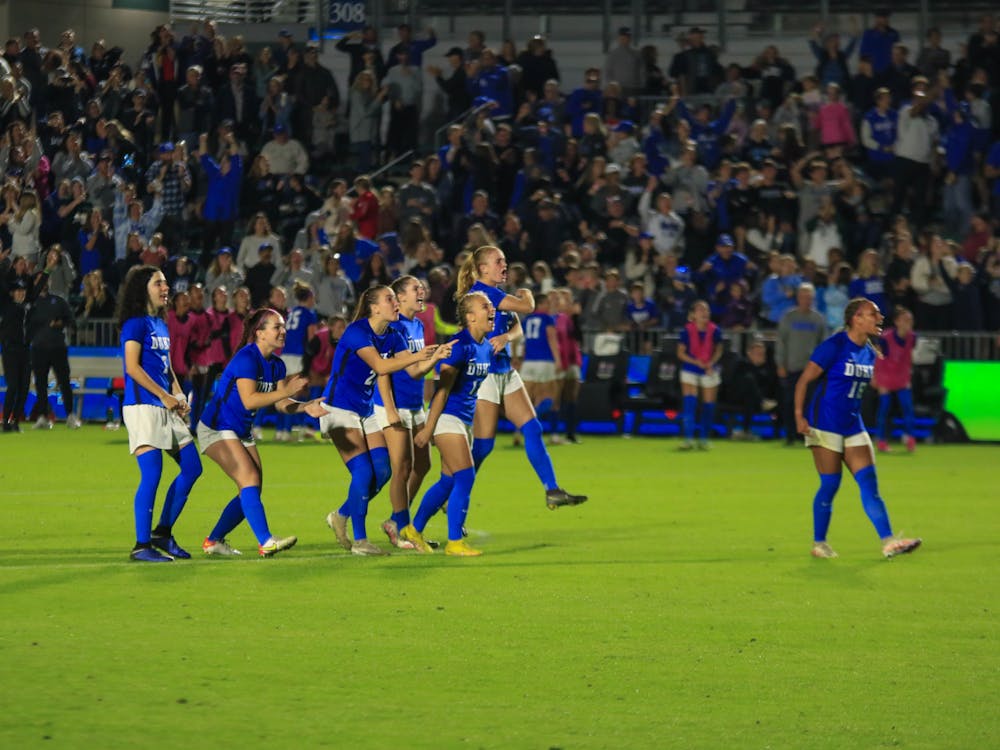Along with the bright lights shining down on WakeMed Soccer Park Thursday night were the cries and yells illuminating yet another Duke-North Carolina game. As the fifth-seeded Blue Devils competed with the first-seeded Tar Heels in the ACC tournament semifinal, there was an ever-growing crowd that increased to more than 2,800 fans by the final whistle. Among the lively atmosphere were two high-energy teams displaying a cinematic performance on the field, both sides proving they were worthy of a ticket to the conference championship game.
But whether it is a regular-season contest or a 110-minute frenzy to advance to the championship, there is always going to be an ending that one side is not hoping for. Thursday night, it was a double-overtime match with an extended nail-biter finish as the Tar Heels advanced past the Blue Devils 7-6 in penalty kicks.
“Our goal is to win a championship, and to win an ACC championship,” head coach Robbie Church said after the game. “And we’re not going to be able to fulfill that. But now our goals have changed, and now our goal is to win an NCAA championship. And if we play like that, with [the] little bit more discipline that we have shown over the last two-and-a-half to three weeks what this team is made of. … [then] we really look forward and embrace that opportunity to play for the national championship.”
Ahead of the penalty kicks, the emotion each team put in was clear in the case of sophomore striker Michelle Cooper, who waved off the pain of her two overtime injuries because she needed to “continue to put everything I can on the line for them [her teammates],” Cooper said. It manifested itself when two players from each team, Duke’s Maggie Graham and North Carolina’s Tori DellaPeruta, received red cards in regulation. It meant the screams of fans from one side saying “Duke sucks!”, while the screams of the other said, “Go Duke!”
In a game in which each team worked diligently through 110 minutes of scoreless soccer, a dissatisfying ending for one side means that there are going to be a lot of emotions left on the field. But above all the energy felt at the stadium—whether it be disappointment, excitement or another—one stood out entirely: a feeling of how good Duke has become, and the potential it has to go far in the postseason.
“People often do those things [scream chants against Duke], because they know how good of a game it’s going to be and how good we actually are and our potential,” Cooper said. “So taking it, and running with it throughout the game is just a huge push of motivation. I mean, it probably helps more than it hurts.”
Though the Blue Devils were not the team to ultimately advance, it is essential to recognize that they did not lose their game to North Carolina in regulation or overtime. From the start of the contest to the end, Duke maintained excellent composure and pacing—both of which made a game that went scoreless one of the most eventful affairs the team had experienced all season, if not the most eventful.
The Blue Devils are notoriously placement-based, meaning they only take shots when the opportunity looks to be there. Against the Tar Heels, Duke remained highly efficient. The Blue Devils had ample opportunities in transition after North Carolina was unable to break through.
The box score reflects that efficiency, as the Tar Heels had 22 shots, 10 of which were on goal and all of which were saved by senior goalkeeper Ruthie Jones. The Blue Devils, on the flip side, took just seven.
The Tar Heels took 12 corner kicks throughout the 110 minutes, but these were no accidents. Each time a North Carolina player got remotely close to the net, either Jones made a save or one of her backers put the ball out of bounds. On almost every corner, that strategy worked in Duke’s favor, as the goalie was perhaps the most diligent defender on the field Thursday. On the corners where Jones did not get the ball, a defender had her back, as Nicky Chico did at one point.
In each team’s effort to score, they changed up the strategy at hand. Duke, which Church noted is “the most adaptable team that we’ve ever had,” not only had to make a lot of adjustments, such as changing the defensive strategy at halftime, but also throughout this season.
To be a national-level contender, it is unavoidable to have to dismiss your losses, and Duke—with four losses this season—has lost more than the preseason No. 2 squad likely expected. But the team—currently ranked No. 6—has proven in recent weeks that it looks a lot closer to its preseason ranking. Duke’s 3-0 loss against North Carolina and 1-0 loss to Virginia earlier in the season are emblematic of that, as the change from then to Thursday night has shown improvements that teams typically take years to see.
If Duke had advanced to the final in penalty kicks to get a chance at revenge against Florida State, perhaps it would have proven its caliber ahead of the NCAA tournament. And considering that North Carolina, Florida State, Notre Dame and Duke rank consecutively in Nos. 3-6 nationally, this was the most competitive conference tournament in the country.
So, with an evident fear from the stands, as well as the tears and raw emotion that Duke felt after North Carolina got that final goal, one thing stands above all—this team has what it takes to be dangerous. They know it, their coaches know it and any spectator knows it as well. If any year is the year for the Blue Devils to make a run for a national championship, it’s this one.
Get The Chronicle straight to your inbox
Sign up for our weekly newsletter. Cancel at any time.

